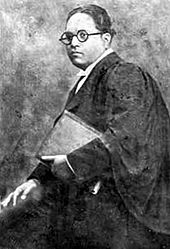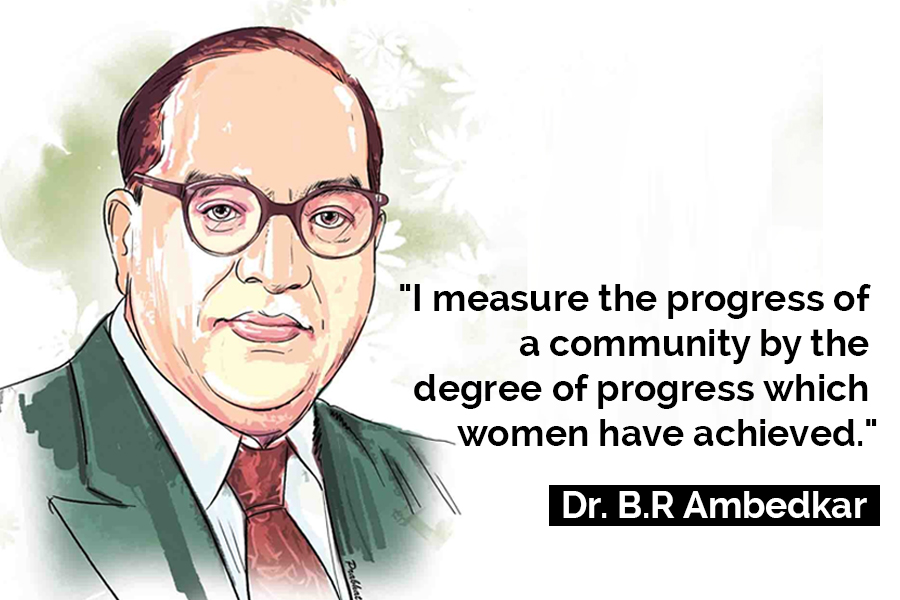Bhimrao Ramji Ambedkar was born in 1981 in an ‘untouchable’ family. He grew up to be one of the most highly educated political thinkers of India. His radical politics, primarily against caste society, was transforming even while he oversaw the drafting of the Indian constitution, and became the first Law Minister of India.
Early Life
B. R Ambedkar was born in a “lowly caste” known as Mahar, defined by the colonial British records as “inferior village servants.” He experienced immense caste discrimination as a child. He describes this experience in his work ‘Waiting for a Visa‘ (1936). In the following lines the terror he faced is visible.
“We were extremely hungry, and wanted very much to eat. But again there was the question of water. So we asked our driver whether it was possible to get water. He warned us that the toll-collector was a Hindu, and that there was no possibility of our getting water if we spoke the truth and said that we were Mahars. He said, “Say you are Mohammedans and try your luck.”
Ambedkar’s father was an officer in the Indian Army. Despite shortcomings, Ambedkar was able to graduate High School and went on to study for a BA in Economics and Politics at Bombay University. He travelled for further education abroad, first at Columbia University in New York where he completed a Masters and a PhD, and later at LSE.

Politics for social reform
Bhimrao returned to India in 1917, and was once again faced with caste discrimination. While he was appointed professor at the Sydenham College of Commerce and Economics in Bombay, other faculty would object to him using the communal water jug. Many such incidents led him to formulate a fight against caste discrimination, and for Dalit rights.
In 1919, Ambedkar spoke for separate electorates and reserved seats for Untouchables and religious minorities, before the Government of India Act, 1919. In 1920 he started a Marathi paper for Dalit awakening and mobilization. In this paper, he criticized caste hierarchy and social inequality. In 1924, he started the Bahishkrit Hitkarni Sabha (Depressed Class Institute) for the upliftment of Dalits.
In numerous periodicals that he started, he wrote about the protection of Dalit rights- for example, the Mook Nayak, Vahishkrit Bharat, and Equality Janta. Among the movements he started were, the Vaikkom Satyagraha in Travancore in Maharashtra,which aimed at the right of the Dalits to worship in Hindu temples without hindrance. Another very significant movement was Mahad March to assert the rights of Dalits to take water from public watering places.
Movement for equality through reservation
The assertion was made for emancipation of the Dalits, through separate electorates, in the colonial period. In the Montague-Chelmsford Reform of 1919, the demand for protection of the rights of Scheduled Castes. In the Round Table Conference at London, Ambedkar spoke for separate electorates for the Scheduled Castes.
At the Round Table Conference of 1930, the British government was to nominate two members from the scheduled castes, to assert their presence in the constitutional process that would eventually lead to the framing of the Government of India Act, 1935.
Drafting the Constitution
In 1947, Ambedkar was invited to be the first Minister of Law in independent India. Shortly after, he became the Chair of the Drafting Committee of the Indian constitution. He was a champion of social-democracy, and consistent in his efforts to voice the oppressed classes of society.
Importantly, he also pointed out the need for gender-equality, within the political democracy. Some key points that he stressed for drafting the constitution were:
- Federalism
- Opportunity for the deppressed classes
- Directive Principles of State Policy

His political ideology reflects in his efforts to create a constitution that considers tradition, freedom and equal opportunity for every part of the Nation to have equal opportunities in an equal race. The need for an inclusive nation, where the struggle continues for the depressed classes to assert their rights, is still relevant to the future of the country.
Read More:














































